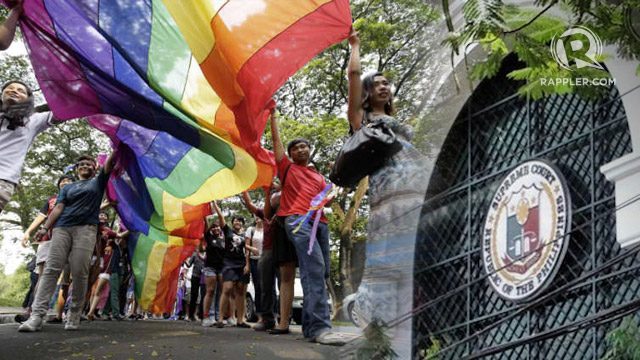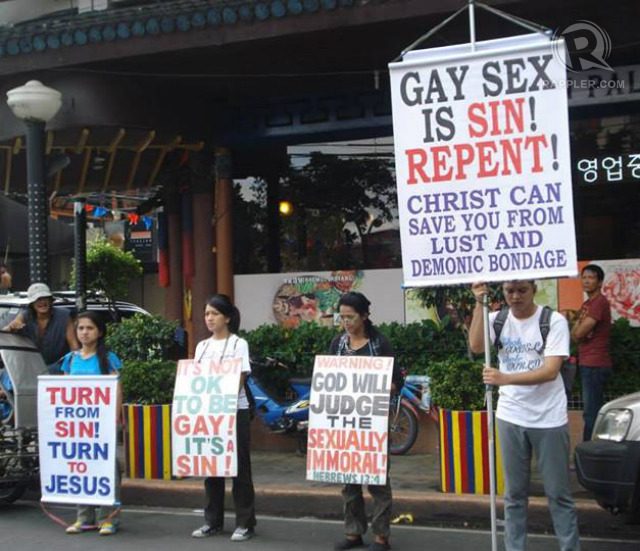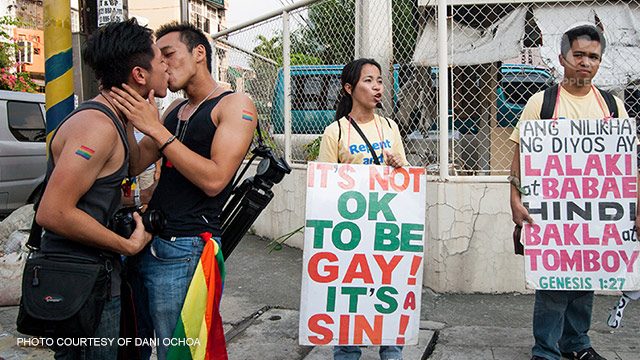SUMMARY
This is AI generated summarization, which may have errors. For context, always refer to the full article.

MANILA, Philippines – A young Filipino lawyer has asked the Philippine Supreme Court (SC) to lift same-sex marriage prohibitions in the country’s almost 3-decade-old Family Code.
The lawyer, who identified himself as openly gay in his May 18 petition, argued that limiting civil marriages and the rights that go with such unions to heterosexuals violate the constitutionally guaranteed protection for equal treatment, undue interference to liberty rights, and marital autonomy.
Petitioner Jesus Nicardo Falcis III said the limitations imposed by the 1987 Family Code favoring only opposite-sex marriages repealed the 1949 Civil Code, which never made such a distinction.
|
Articles 1 and 2 of the Family Code reads: “Art. 1. Marriage is a special contract of permanent union between a man and a woman entered into in accordance with law for the establishment of conjugal and family life. It is the foundation of the family and an inviolable social institution whose nature, consequences, and incidents are governed by law and not subject to stipulation, except that marriage settlements may fix the property relations during the marriage within the limits provided by the Code. Art. 2. No marriage shall be valid, unless these essential requisites are present: (1) Legal capacity of the contracting parties who must be a male and a female; and (2) Consent freely given in the presence of the solemnizing officer.” (emphasis supplied) |
His petition was submitted to the High Court a few days before a historic referendum in Ireland approving gay marriage.
“I was happy with the development. It gives me hope that a Catholic country can accept gays as equals in the eyes of the law,” he said of the Ireland vote.
“The message it gives me is that people can be rational in delineating between religious views and secular or legal views. That your religion shouldn’t be imposed on others,” he added.
Same-sex marriage is “of transcendental importance to the nation because of the millions of LGBT (Lesbian, Gay, Bisexual, Transgender) Filipinos all over the country who are deprived from marrying the one they want or the one they love,” read the petition.
“Those who pursue same-sex relationships despite the stigma are deprived of the bundle of rights that flow from a legal recognition of a couple’s relationship – visitation and custody rights, property and successional rights, and other privileges accorded to opposite-sex relations,” it said.
First of its kind
Obtained by Rappler, the 31-page plea highlighted the need for a more LGBT-inclusive society and is the first known and reported legal action of its kind before the Philippine SC.
Bills seeking to allow same-sex marriage have surfaced in the past but no law has been enacted to date.
The SC may or may not act upon the petition, a legal dilemma sure to draw varied social commentaries in the predominantly Catholic country of 100 million.
Falcis explained to Rappler that “no actual case unfolds such as a gay couple going to the local civil registrar and applying for a marriage license” because of prevailing social attitudes against same-sex relationships. (READ: Remarks vs Laude reflect deep-seated prejudice – CHR)
“No one has dared assert their right in a society where they would probably be ashamed and discriminated [against] for doing so,” he said.
Catholic prelates in the Philippines have condemned gay marriages, even claiming that priests who solemnize such marriages are liable under the law.

While social attitudes are becoming increasingly tolerant, many conservatives still believe homosexuality is immoral. Violence against LGBTs persists. (READ: Is the Philippines really gay-friendly?)
In his petition, Falcis argued that he “has a personal stake in the outcome of this case” being “an open and self-identified homosexual.”
He said he “has grown up in a society where same-sex relationships are frowned upon because of the law’s normative impact.”
His “ability to find and enter into long-term, monogamous same-sex relationships is impaired because of the absence of a legal incentive for gay individuals to seek such relationship,” he added.
Unfair prohibition
Sharing his thoughts on gay marriage, President Benigno Aquino III had earlier questioned if such a union is “something that is desirable in an environment for a child.”
In the petition, Falcis argued that “heterosexuals are no better parents than homosexuals” just as “homosexuals aren’t necessarily worse parents than heterosexuals.”
“Homosexuals can raise children well in the same manner that heterosexuals can. While there is no assurance that gays will not be bad or incompetent parents, there is also no assurance that heterosexuals will not be bad or incompetent parents,” he explained.
He added that “same-sex couples can formally adopt children as individuals under Philippine law or informally adopt children jointly” even with the marital prohibition in place.
No compelling state interest exists to limit civil marriages to opposite-sex couples, he said, adding that “homosexuals just like heterosexuals can fulfil the essential marital obligations laid down by the Family Code.”
“Both straight and gay couples have the same chances of breaking up or falling out of love,” he said.
“Sexual orientation by itself is not debilitating to a person’s ability to function,” he argued.
The University of the Philippines alumnus stressed that procreation is not a legal requirement in the formation of a family.

Not a choice
Falcis said sexual orientation is central to one’s identity.
“Homosexual individuals cannot change or choose to be straight in the same way that heterosexuals or straight individuals cannot choose to be gay,” he said.
The lawyer challenged that notion of “sexuality as a choice or preference.”
“While any individual can choose to have sex with any individual of the same or opposite sex, they cannot choose who they have feelings of sexual attraction with, such as butterflies in the stomach or erotic sexual arousal,” he added.
This supports the legal argument that the exclusion of LGBTs from civil marital unions is an unfair classification, he said.
In the Philippines and elsewhere in the world, most closet gays fear conservative backlash ranging from social rejection to violence.
According to data collated by the Philippine LGBT Hate Crime Watch, there have been around 164 cases of murdered LGBTs in the country from 1996 to June 2012.
The number is projected to be higher given unreported incidences. A recent politically charged case involves a transgender woman who was choked from behind and drowned in the toilet of a cheap hotel.
In response to increasing violence targeted against LGBTs, the Philippine Commission on Human Rights made a move to protect the interests of the LGBTQ community by documenting hate crimes – violence done on the basis of the victim’s sexual orientation and gender identity (SOGI) – against LGBTs across the country.
The creation of safe spaces – establishments where LGBTs can freely express their sexual orientation and gender identity – and the conduct of gender sensitivity training in law enforcement agencies are among the things that advocates continue to fight for. – with a report from Reynaldo Santos Jr/Rappler.com
Add a comment
How does this make you feel?
![[In This Economy] A counter-rejoinder in the economic charter change debate](https://www.rappler.com/tachyon/2024/04/TL-counter-rejoinder-apr-20-2024.jpg?resize=257%2C257&crop=267px%2C0px%2C720px%2C720px)
![[Vantage Point] Joey Salceda says 8% GDP growth attainable](https://www.rappler.com/tachyon/2024/04/tl-salceda-gdp-growth-04192024.jpg?resize=257%2C257&crop_strategy=attention)
![[ANALYSIS] A new advocacy in race to financial literacy](https://www.rappler.com/tachyon/2024/04/advocacy-race-financial-literacy-April-19-2024.jpg?resize=257%2C257&crop_strategy=attention)


There are no comments yet. Add your comment to start the conversation.